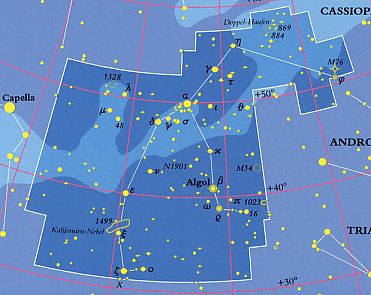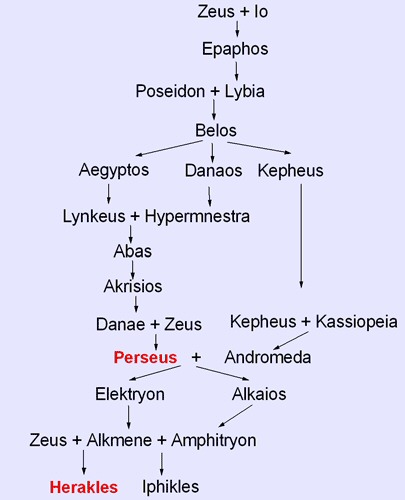Let yourself be enchanted a little by the Greek mythology!
The original text is from Gustav Schwab: The legends of classical antiquity. I have tried to dust off the text a little.
Danaë and Zeus
Danae is the daughter of Acrisius, king of Argos. The king was prophesied in an oracle saying that a grandson would steal his throne and life. This grandson Acrisius was determined to prevent. When the daughter was of marriageable age, he had her locked in a tower that was only accessible from above.
So there she lay, the daughter, stretched out on her bed. Dressed only in her lovely clothes and dreaming a girl's dream - probably of the Greek hero who would save her. (Knights in golden armor on white horses had not yet been invented.)
King Acrisius did not reckon with godfather Zeus. He saw Danaë and her curves and was enchanted by her sight. Since his wife Hera was busy elsewhere, he began to think about how he could seduce Danaeus. A swan - no, it can't land in a tower and besides: we already had that. A bull - there was no room in the tower. He would have to fall down from above - that was the brilliant idea. In the shape of a golden rain it came over Danae. Exactly how he did it is up to each individual's imagination
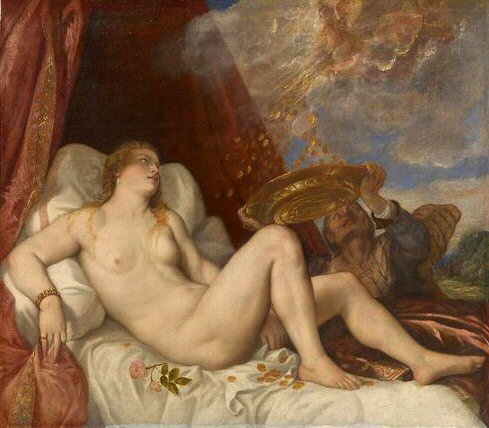
Various artists have tried to represent this. In Rembrandt's and Titian's work, a golden rain falls gently caressing them. The artists also want to make us believe that there was a servant who wanted to catch some of the laburnum. Nonsense! Danae and her laburnum were probably all alone. Zeus can't stand an audience at a time like this. Gustav Klimt is getting closer. In his painting you can see the lascivious rapture of Danaë and how the laburnum stormy penetrates her, and there is no one to disturb.
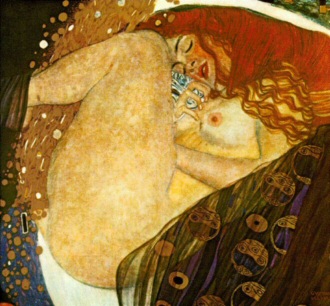
The event was not without consequences. Nine months later, Danaë gave birth to a boy, Perseus.
When Acrisius learned of the birth he was horrified. He thought of the oracle and felt his life threatened. Killing the grandson - no, he couldn't bring himself to do that. He had Danaeus and Perseus locked in a box and thrown into the sea. What a solution to the problem!
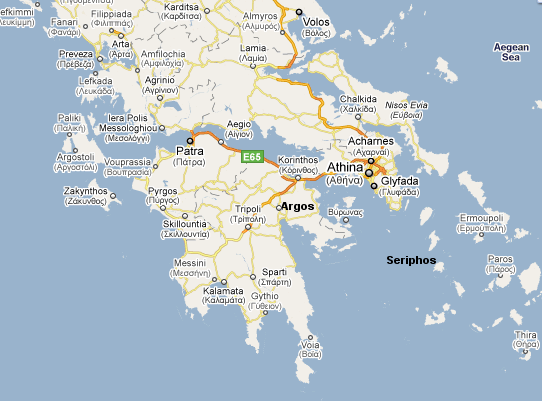
But Zeus protected them both in the storms of the sea, and the box drifted near the island of Seriphos- Today, Serifos, a Cyclades island - has come ashore. Two brothers, Dictys and Polydektes, ruled there. Dictys was fishing when the box came to the shore and pulled it ashore. Both brothers took care of the abandoned one in a helpful way. Polydektes saw in Danae his dream woman and married her. The son of Zeus, Perseus, was carefully brought up by him.
variant:
Finally they were stranded on the island of Seriphos, where the fisherman Diktys found them and welcomed them. There Perseus grew up to be a young man. The brother of Dictys
Polydektes was the ruler of this island. The beauty of Danaës had not remained hidden in him and finally he was inflamed with love for her.
But Perseus watched over his mother and the king therefore did not dare to take Danaeus by force. One day Polydektes invited Perseus to his court. During a meal he asked for a
suitable gift for the king. Perseus replied: "If you, O king, would ask, I would bring you the head of the terrible Gorgon Medusa!"
Here, the king saw his chance to get rid of the troublesome young man and ordered Perseus to bring him the head of the Gorgon.
And so Perseus set out to find the Gorgon Medusa.
Perseus and the Head of the Gorgons
When Perseus grew up, his stepfather persuaded him to go out in action and do something big. The brave young man showed himself willing, and soon they agreed that Perseus should cut off the terrible head of Medusa and bring it to the king at Seriphos. Perseus set out and, under the guidance of the gods, came to the far-off region where Phorkys (old sea god), the father of many horrible monsters, lived. Here he first met three of his daughters, the Greens or Greys. They were grey-haired from birth, and all three of them together had only one eye and one tooth, which they lent each other in turn for use. They also stank terribly. Perseus asked them where he could find the Gorgons but they would not tell him. So Perseus resorted to a ruse and took away their eye and tooth. When they begged him to give them back the most indispensable things, he only agreed to give them back on condition that they show him the way. Then he gave them back the eye, the tooth he threw into the lake. The grasses had to dive in the lake for the tooth and were finally washed.
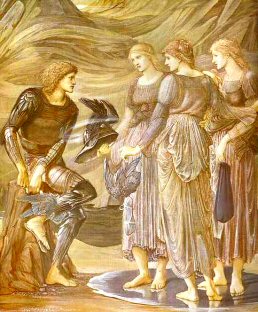
The nymphs who lived by the lake were very happy that the stench had come to an end and gave him winged shoes, a push bag (deep pocket, shoulder bag) and a camouflage helmet. Those who wore them were able to fly wherever they wanted, saw whom they wanted, and were not seen by anyone.
In addition, he received an iron sword from Hermes and a shield from Pallas Athena. This shield was polished inside and shone like a mirror. So equipped he flew to the ocean, where the other three daughters of Phorky, the Gorgons, lived.
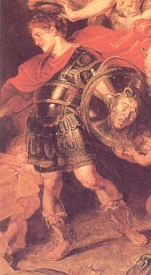
Perseus found the monsters asleep. Only one of them, Medusa, was mortal. The heads of the Gorgons were covered with dragon scales, covered with snakes instead of hair, they had big fangs like pigs, iron hands and golden wings with which they flew. Anyone who looked at them was turned to stone by this sight. Perseus knew that. That is why he stood before the sleeping ones with averted face and caught their triple image only in his shining iron shield. Thus he found the Gorge Medusa, Athena led his hand, and he cut off the head of the sleeping monster without danger. No sooner had this been accomplished than a winged steed, Pegasus, and a giant, Chrysaor, sprang from the fuselage. Both were creatures of Poseidon. Perseus now pushed the head of Medusa into the thrust bag and removed himself backwards as he had come.
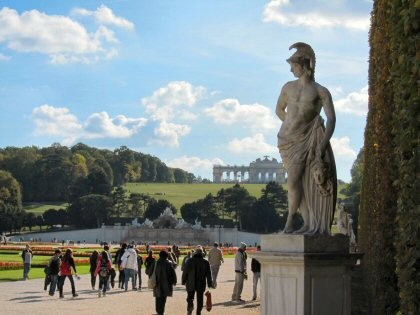
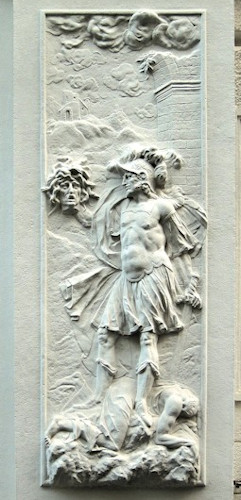
This scene can be admired on the facade of the Winter Palace of Prince Eugene in Vienna's Himmelpfortgasse (former Ministry of Finance).
(right portal fresco, renovated 2012)
In the castle park Schönbrunn you will find among many other figures from Greek mythology also Perseus with the Gorgon head.
Meanwhile the sisters of Medusa had risen from the camp. They saw the torso of the slain sister and rose on their wings to pursue the robber. But the nymph's helmet hid him from their eyes, and they could see him nowhere. Meanwhile, in the air, the winds took hold of Perseus and hurled him, like a cloud of rain, sometimes there, sometimes there. As it floated over the sandy deserts of Libya, bloody drops of the head of Medusa trickled down to the earth, which caught them and animated them to form colorful snakes. Since then, there have been so many dangerous vipers in that area.
Perseus and Atlas
Perseus now flew further westward and finally lowered himself in the realm of king Atlas to rest a little. He was tending a grove of golden fruit with a mighty dragon. In vain, the Gorgon's conqueror asked him for shelter. Fearing for his golden possessions, Atlas pushed him mercilessly away from his palace. And Perseus was enraged and said: "You will not grant me anything, but at least receive a gift from me." He took the Gorgo out of his pack, turned away and stretched it out to King Atlas. As tall as the king was, he was instantly turned to stone and turned into a mountain; his beard and hair grew into woods; his shoulders, hands and bones became rocky ridges; his head grew as a high peak into the clouds.
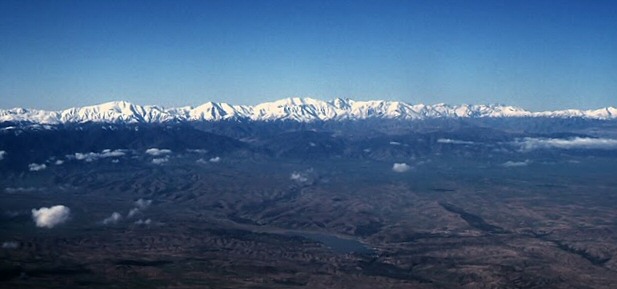
The Atlas Mountains still extend today over a length of 2,237 kilometres from Tunisia to Morocco. The High Atlas is the highest part of the entire system. The mountain Toubkal reaches a height of 4'165 meters
Perseus and Andromeda
Perseus put on his winged shoes, put on his push bag, put on his helmet and swung into the air. In another version he simply flew with the horse Pegasus. On his flight he came to the coast of Ethiopia, where the king Cepheus [1] reigned. Here he saw a virgin bound with chains to a towering sea cliff. If a gentle breeze had not moved her hair and tears had not streamed from her eyes, he would have thought she was a marble statue. He almost forgot to move his wings in the air, so enchanted was he by the charm of her beauty. "Speak, beautiful virgin," he addressed her, "you who deserve a completely different kind of jewellery, why are you chained here? Tell me the name of your country, tell me your own name.
The girl kept silent in shame. She was afraid to address the stranger and would have liked to cover her face with her hands if she could have stirred. Her eyes filled with tears. At last, so that the stranger would not believe that she had her own guilt to hide from him, she replied: "I am the daughter of Cepheus, king of the Ethiopians and my name is Andromeda. My mother Cassiopeia had bragged against the daughters of Nereus, the sea nymphs, that she was more beautiful than all of them.
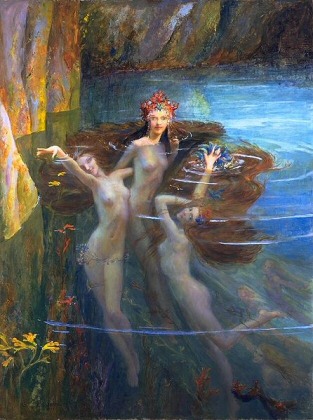
The Nereids were angry about this and their friend, the god of the sea, caused a flood and a devouring sea monster to come over the land. (The terrible monster KETOS is sometimes called the whale). An oracle promised us liberation from the plague if I, the queen's daughter, was thrown to the monster to eat. The people asked my father to take this lifesaver, and desperation forced him to tie me to this rock.
She had not yet uttered her last words when the waves roared and a monster emerged from the depths of the sea, its broad chest taking up the entire surface of the water all around it. The girl wailed loudly; at the same time one could see her father and mother hurrying towards her, both desolate, but in her mother's features the consciousness of guilt was evident. They embraced the bound daughter, but brought her nothing but tears and lamentations.

Now the stranger began: "You'll have plenty of time to complain. The hour of salvation is short. I am Perseus, son of Zeus and Danae, I have defeated the Gorgon, and wonderful wings carry me through the air. Even if the virgin was free and had to choose, I would not be contemptible as a son-in-law. Now I woo her by offering to save her. Do you accept my terms? Who would have hesitated in such a situation? The delighted parents promised him not only the daughter, but also their own kingdom for his dowry.
While they were negotiating this, the beast had swum in at lightning speed and was only a slingshot away from the rock. With a mighty leap, Perseus swung high into the clouds. The animal saw the shadow of the man on the sea. As it raged on him as if he were an enemy threatening to snatch the prey from him, Perseus descended from the air like an eagle, stepped floating on the back of the beast and lowered the sword with which he had killed the Medusa, into the body of the sea monster under his head up to the pommel. No sooner had he pulled it out again than the fish jumped high into the air, soon it dived under the tide again, soon it raged to both sides, like a boar being chased by dogs. Perseus taught it wound after wound until a dark stream of blood spilled from its throat. Meanwhile, the wings of the demigod hit him, and Perseus no longer dared to trust the water-heavy plumage. Fortunately, he saw a rocky reef, its top point protruding from the sea. He leaned on the rock face with his left hand and thrust the iron three or four times into the monster's mesentery (intestines).
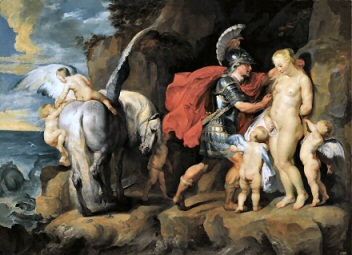
The sea drove the enormous corpse away, and soon it disappeared in the floods. Perseus, meanwhile, had swung ashore, climbed the rock and untied the virgin, who greeted him with
glances of thanksgiving and love. He brought her to his happy parents, and the golden palace received him as bridegroom.
The wedding meal was still steaming, and the hours passed in carefree haste for the father and mother, the groom and the saved bride, when suddenly the forecourts of the royal
castle filled with a dull, roaring turmoil. Phineus, the brother of king Cepheus, who had once wooed his niece Andromeda but had left her in her final distress, approached with a
band of warriors and renewed his claims. Swinging his spear, he entered the wedding hall and called out to the astonished Perseus:
"See me here, I have come to take revenge, since you have taken my wife from me; neither your wings nor your father Zeus shall snatch you from me! So he cried out and was about to throw his spear: then Cepheus the king rose from the meal. "Raging brother," he cried, "what thought drives you to do wrong? It is not Perseus who robs you of your beloved; she was already snatched from you when we delivered her to death, when you watched as she was tied up and neither as uncle nor as beloved lent her your assistance. Why did you not take the prize from the rock to which it was forged? So at least leave alone the one who won it, who comforted my old age by saving my daughter!"
Phineus did not answer him, he just looked at his brother and his rival alternately, sometimes with grim looks, sometimes at his brother and sometimes at his rival, as if he was thinking about who he should aim at first. At last, after a short delay, he swung the spear against Perseus with all the strength that his anger gave him; but he made a misthrow, and the weapon got stuck in the cushion. Now Perseus rode up from the camp and hurled his spear at the door through which Phineus had entered, and he would have pierced the chest of his mortal enemy if the latter had not fled with a leap behind the house altar. The bullet had struck the forehead of one of his companions, and now the retinue of the intruder came into the melee with the guests who had long since been disturbed by the table. The battle was long and murderous; but the invaders were outnumbered. Finally Perseus, at whose side the parents-in-law and the bride pleaded in vain for protection, was surrounded by Phineus and his thousands. From all sides the arrows flew past them like hailstones in a storm. Perseus had leaned his shoulders against a pillar and thus covered his back. Turning to the host of the enemy, he stopped the enemy's advance and struck down one by one.
It was only when he saw that the bravery of the multitude must succumb that he decided to use the last but unmistakable means at his disposal. "Because you force me," he said, "I will get help from my old friend! Turn away his face, who is still my friend! With these words, he pulled the Gorgon head out of the pocket that was always hanging by his side and stretched it out to the first enemy who was about to enter. "Seek others," cried the Gorgon scornfully at first sight, "whom you can shake with your miracle. But when his hand wanted to rise to hurl the spear, he remained petrified in the middle of this gesture, like a statue. And so it happened one by one. At the end, there were only two hundred left. Then Perseus lifted the head of the Gorgon up in the air for all to see and turned the two hundred into a solid rock.
Only now did Phineus regret the war he had wrongly started. To the right and left he saw nothing but stone images in the most varied positions. He called his friends by name, he touched the bodies of the first ones in disbelief: everything is marble. Horror seizes him, and his defiance is transformed into humble supplication. "Leave me only life, yours be the kingdom and the bride," he cried, turning his despondent face sideways. But Perseus, bitter at the death of his new friends, knew no mercy. "Traitor," he shouted angrily, "I want to create a lasting monument to you in my father-in-law's house for all eternity! And however Phineus tried hard to avoid the sight, the outstretched horror soon hit his eye: his neck froze, his moist gaze turned to stone. So he stood still with a fearful expression, his hands lowered, in a servantlike, humble position.
The oracle saying comes true
Without hindrance, Perseus now led his beloved, Andromeda, home. Long happy days awaited him and he also found his mother Danaë again. But he was to fulfill the destiny of his grandfather Acrisios. He had fled to a foreign king in Pelasgerland for fear of the oracle's verdict. Here he helped celebrate fighting games when Perseus arrived, who was on his way to Argos to greet his grandfather. An unfortunate throw of the disc hit the grandfather of the grandson's hand, without the grandson knowing or wanting to meet him. Not for long did he not know what he had done. In deep mourning he buried the Acrisios outside the city and exchanged the kingdom that had fallen to him through the death of his grandfather. But the envy of fate no longer haunted him. Andromeda bore him many glorious sons, and the glory of the father lived on in them, as for example in Heracles (Hercules, son of Zeus and Alkmene) who was a grandson of the two.
The Perseus Saga in the Night Sky
From the Perseus saga, several actors can be found in the autumn sky.
Not far from the celestial pole, the Cepheus (Cepheus) is enthroned. Next to it the five most prominent stars of Cassiopeia form a celestial "W". Andromeda's light arc of stars spans a bridge between the far-flung Pegasus and Perseus. As befits a shining hero, Perseus also has the brightest star in the whole group, Algenib. In the constellation of Andromeda there is the Andromeda Nebula, which can be observed with the naked eye, 2.25 million light years away.
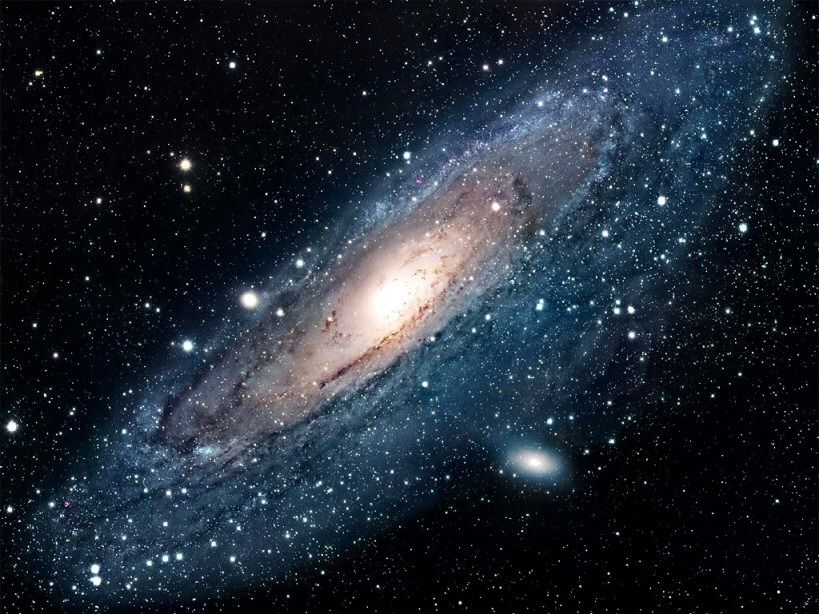
Clearly set off and sluggish, the legendary sea monster rises above the horizon - as the constellation whale (lat.: Cetus). In former times it was drawn into the celestial atlases with its mouth wide open and its long fish tail. In 1596 David Fabricius discovered a star on its neck which was not recorded in any map. The star soon became invisible, but reappeared later. Every year the strange spectacle was repeated. No one had ever reported similar phenomena before! Fabricius christened the star "Mira" (lat., "the wonderful one").
Old celestial globes show Perseus with a mighty sword in one hand and the head of Medusa in the other. Thus the Gorgo has also found its place in the firmament, although not as an independent constellation. One of its eyes is marked by the star Algol. Its name comes from the Arabic and means "head of the demon".
Normally Algol shines almost as brightly as the mentioned Algenib. But every three days Algol's shine collapses for a few hours. Algol is then considerably weaker than Algenib. Medusa's eye seems to "blink".
